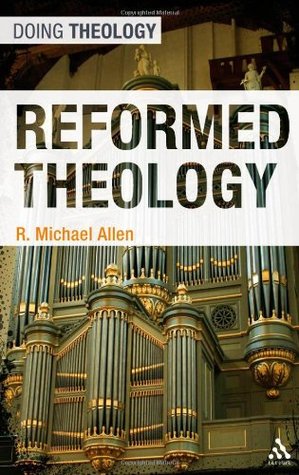Allen, R. Michael,  Reformed Theology
Reformed Theology
(Doing Theology; London: T&T Clark International, 2010), xi + 217
ISBN: 978-0-567-03430-4
R. Michael Allen’s Reformed Theology is a welcome contribution for those who claim the tradition and those who do not. Allen is no impartial observer but an insider, a committed and thoughtful participant in the tradition who mines the Reformed confessional, dogmatic and exegetical heritage to delineate the central doctrinal commitments of his theological tradition. Although emerging from the Reformation and maintaining a ‘Reformational’ theology, it is to be distinguished from other Reformational groups such as Lutheranism, Anglicanism, and Anabaptism. Allen develops his outline of the tradition in eight chapters dealing with the Word of God, Covenant, God and Christ, Faith and Salvation, Sin and Grace, Worship, Confessions and Authority, and Culture and Eschatology. In so doing he demonstrates that Reformed theology cannot be dismissed as narrowly focussed on the so-called doctrines of grace or the “five points of Calvinism.” Rather, the Reformed tradition has a distinctive contribution to make across the whole spectrum of Christian theology.
Indeed, Allen argues that “Calvinism” is a misnomer and should be dropped entirely (3). He acknowledges the breadth and diversity of the tradition, although he is also clear that he stands within the conservative camp. He engages with voices from all sides of the tradition and acknowledges the critique of the “revisionists” where he feels it is appropriate. He is unafraid to make judgements: although a Reformed pastor, Schleiermacher is ‘outside the Reformed movement doctrinally’ (92); Karl Barth is a valued co-traveller in the tradition, though Allen often prefers the formulations of the tradition to those of the Swiss theologian.
The origin and formal principle of Reformed theology is the Word of God spoken to humanity, which takes several forms, primarily Jesus Christ, but also the Scriptures which constitute the normative witness to and source of our knowledge of God. Throughout the book Allen affirms the ‘regulative principle’ whereby Scripture functions to order the faith, theology, practices and structures of Reformed churches. If Scripture is the formal principle of Reformed theology, the leading material principle is the idea of the covenant. Allen, however, wants also to set alongside the material principle the ‘key theological tenets of the Reformed identity: justification, predestination, etc.
Reformed theology is confessional theology, undertaken in an ecclesial context where sola scriptura reigns, though, it must be acknowledged, ‘sola scriptura is not nuda scriptura’ (138). In his exposition of theological authority Allen follows Heiko Oberman’s suggestion that Protestant churches maintain a single-source theory with respect to the relation between Scripture and tradition; nevertheless, ‘the importance of tradition is underlined as the conduit by which Christ rules his church’ (139f.). Tradition is a legitimate though derivative and provisional authority in the contemporary church; nonetheless traditional formulations function as a legal authority—within the economy of the Spirit’s grace (142, 144f.; cf. 116), such that confessions ‘are formal texts that serve as rules for the theological beliefs of pastors and elders’ (145). Allen struggles to affirm both the binding authority and the provisionality of the confessions. He acknowledges the plurality and diversity that exists, particularly in recent confessions, and is concerned that loss of coherence between the various instruments is a danger confronting the Reformed churches. He insists that,
The enduring legacy of the Reformed reformation cannot simply be reduced to its formal principle: reform by Scripture alone. Many have been tempted to sever the formal from the material, taking the Reformed tradition as a constantly revolutionary process … But cultural and religious iconoclasm is not the Reformed vision or the practice of reforming church practice. It must also be guided by the material principle and key theological tenets of the Reformed identity: justification, predestination, etc. … Reformed theology is committed to the sole final authority of the Bible, to be read amongst the church and under the authority of her official confessions’ (154f.).
The difficulty observed here is not simply that which arises between theological authority and freedom, but between the formal and material principles of Reformed theology. Allen appeals to the Westminster Confession of Faith to specify the regulative principle, namely, only what is ‘either expressly set down in Scripture, or by good and necessary consequence may be deduced from Scripture’ is authoritative, ‘unto which nothing at any time is to be added, whether by new revelations of the Spirit, or traditions of men’ (139; WCF I.6). On this basis Allen outlines the Reformed argument for doctrines such as definite (i.e. ‘limited’) atonement and infant baptism. In both cases he fails to convince those not already convinced, and leaves the impression that covenant hermeneutics have been elevated above the primacy of Scripture. I suspect that Allen himself is not entirely comfortable with classic covenant theology; he suggests that ‘perhaps a way forward in Reformed theology will be found by combining Barth’s knack for lovingly describing the epistemic priority of God’s self-revelation, with the variegated narrative described in the “federal theology”’ (50). One unfortunate omission is the lack of explicit treatment of reprobation, which is a major concern for many outside the Reformed camp. Allen approaches the doctrine implicitly in a discussion of divine and human action (107-110). He acknowledges the need for more work ‘within the exegetical and dogmatic realms in showing how Jesus talks of judgment and love, and the Reformed tradition needs a new defense of the doctrine of hell and judgement, indeed, of God’s justice’ (110).
Reformed Theology is a well-written and generous book providing an excellent overview of the major features, methods and commitments of the Reformed doctrinal tradition. I hope it gains the wide reading it deserves, especially amongst those who seek a better, sympathetic understanding of the tradition, and also amongst those who self-identify as Reformed but whose exposure to the tradition has been unnecessarily narrow or even shrill.
 I looked forward to reading this for quite some time, having very much appreciated Rowling’s Harry Potter series. The novel begins with the event which sets the whole story in motion. A man dies, and so must be replaced on the parish council of the little English village of Pagford. As the story proceeds, however, it is apparent that the village is riven with strife, power-struggles, competing moral visions, and disunity. The blurbs on the back cover refer to it as “a wonderful novel,” a “brilliant novel,” and a “great novel.” Beauty, I guess, is in the eye of the beholder.
I looked forward to reading this for quite some time, having very much appreciated Rowling’s Harry Potter series. The novel begins with the event which sets the whole story in motion. A man dies, and so must be replaced on the parish council of the little English village of Pagford. As the story proceeds, however, it is apparent that the village is riven with strife, power-struggles, competing moral visions, and disunity. The blurbs on the back cover refer to it as “a wonderful novel,” a “brilliant novel,” and a “great novel.” Beauty, I guess, is in the eye of the beholder.